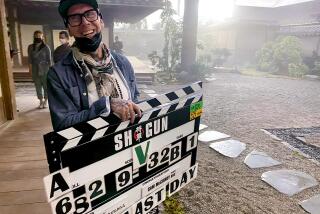MOVIE REVIEW : ‘Sorghum’ Treats Sprawling Epic Like a Family History
- Share via
“Red Sorghum” (Friday at the Fine Arts) is a movie lover’s thrill. You can sense that it’s going to be from its first seconds, as a beautiful and extremely reluctant young country girl is prepared for her arranged wedding.
The director, Zhang Yimou, is a visual sensualist, isolating details for us that might have come straight from the bride-to-be’s memory: the sprays of silver flowers tucked into her thick braid, the shocking scarlet silk of her padded wedding jacket, the pair of heart-shaped wire scissors she hides inside her bodice. Her father is marrying her off to a rich leper--the scissors are her own idea.
“Red Sorghum” is an epic story, funny, bawdy, beautiful and dreadful all at once, set in the 1920s and early 1930s in a wind-swept northern province of China. It’s a legend now, a story that may be meant to parallel China’s own, but Zhang treats it like intimate family history: How my grandmother met and didn’t marry my grandfather, the saga of two nut-hard, unquenchable peasants, told to us by their grandson--unseen.
Everything seems to work on this young director’s sensibilities, a wind that blows the cane-like sorghum, a pile of vivid silk quilts--the only bit of color to soften a rude country bedroom, or the glance between a young man and woman that ignites the story.
Zhang is going for panorama here, movie making on the scale of Kurosawa’s “Dersu Uzala,” but he’s careful to root it in commonplace details of nature and human nature that speak to everyone.
Like “Yellow Earth,” “Red Sorghum” opens with the sedan-chair journey of an apprehensive bride veiled in red silk, across dusty hills to her wedding. It’s a trip you wouldn’t want to make, the sweating, laughing young sedan-chair carriers jolt the chair unmercifully, chanting songs about her husband-to-be’s “squashed nose and piggy, piggy eyes,” trying to make her cry. It’s like a violent shivaree, one day early.
And it’s what brings the two principals together. Close to their destination, the procession is terrorized by a bandit, supposedly the dreaded Sanpao, who threatens to make off with the young woman. The carriers, led by the engagingly jug-eared Jiang Wen, kill him, but in the fracas, there’s that glance.
She does marry the leprous winery owner (also unseen), but two days later, on a dutiful visit to her parents, she’s abducted in the 6-foot-tall sorghum fields.
It’s the film’s most extraordinary sequence. We, and she, know instantly that it’s Jiang, who carries her into the middle of the sorghum forest, then tramples it around and around until it’s a carpeted, fenced private world. And as he moves toward her, all around them the sorghum blows, in crisscrossing currents. Not even Rhett Butler had such forces of movie making behind him.
By the time she returns to the winery, her husband has been mysteriously dispatched. The winery is in decline, its workers about to scatter, but they look on this young widow as their mistress, and she manages to respond. (Actress Gong Li, just 22, seems to grow in maturity and command before our eyes.) She’s a fierce heroine. When her lover Jiang swaggers back to her, boasting drunkenly in front of her men that she can’t resist him, she locks him out in fury. Love among the sorghum is no excuse for boorishness.
So we move into this saga of banditry, braggadocio, kidnaping, passionate reconciliation and the pair’s struggle to build a winery and a family. To be sure, the winery grows out of the shared efforts of all concerned, and one of the film’s indelible figures is its foreman Luohan (Teng Ru-Jun), who will turn out to be a peasant-organizer.
None of this is surprising. However, converting anybody seems the last thing on director Zhang’s agenda; he’s too busy with the forward sweep of his narrative and with strong, clear characterizations.
In the 1930s, when the couple’s little son is 9, the Japanese invade this part of the countryside. Intent on building roads, the Japanese deal with any hint of opposition with grotesque brutality. (Be prepared for this scene, one of the most horrifying I can recall--the hatred that comes with the memory of that period dies very hard, apparently.) Zhang balances the aftertaste of this horror with a climax of cinematic fireworks: full-scale warfare of the Chinese against their invaders and an eclipse of the sun that almost but not quite eclipses the violence that preceded it.
If artists can be said to be born to their field, this 37-year-old was cinema-doomed from the cradle. Whether Zhang is something of an exception, a cinema prodigy, is hard to know. What seems impossible is that “Red Sorghum,” the Grand Prize winner at the Berlin Festival this year, is his first film as a director. (Right here, mention should be made of “Red Sorghum’s” cinematographer Gu Changwei, whose images are voluptuous in their Cinemascope vastness, and of Zhao Jiping’s vivid score.)
Before this, Zhang was the virtuosic cinematographer on Chen Kaige’s arrestingly beautiful “Yellow Earth” and “The Big Parade,” and on Wu Tianming’s “The Old Well,” very different styles of camerawork. And, presumably to ward off boredom, he was also “The Old Well’s” principal actor, a performance for which he won the Tokyo Festival’s best actor award.
What do they teach at the Beijing academy, anyway? And what does the Xi’An Film Studio nurture? Amazing.
More to Read
Only good movies
Get the Indie Focus newsletter, Mark Olsen's weekly guide to the world of cinema.
You may occasionally receive promotional content from the Los Angeles Times.










